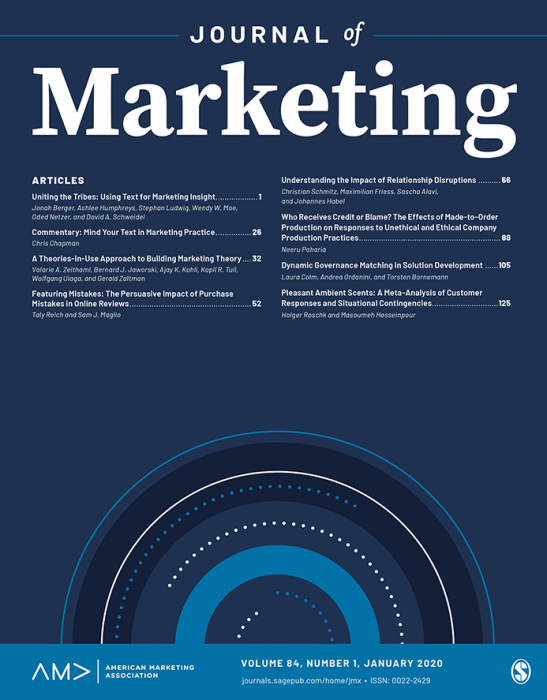《缩小知识差距:了解并减少食物选择对环境的影响》
IF 10.4
1区 管理学
Q1 BUSINESS
引用次数: 0
摘要
全球粮食系统对环境有很大的影响。通过将家庭食品采购转化为温室气体(GHG)排放和土地使用等环境成本因素,本研究利用两个支持可持续发展的市场(德国和荷兰)的家庭面板数据,考察了10年期间食品采购的可持续性。在这些国家,家庭食品篮子的环境强度并没有随着时间的推移而下降。尽管更年轻、受教育程度更高的家庭开始改变他们的饮食习惯,但植物性替代品在食品饮食中的比例仍然很低。作者提出,一个促成因素是缺乏环境知识,他们通过开发一款应用程序来解决这个问题,该应用程序可以就消费者购买食品相关的排放提供个性化反馈。该应用程序还允许用户根据自己的饮食偏好创建可持续的杂货包。两个实验表明,与应用程序交互(1)提高了与食品相关的主观和客观环境知识,这种改善大部分持续超过六个月,(2)减少了与所述食物选择相关的温室气体排放高达33%。这些减少是由应用程序中的不同信息格式驱动的,包括同行比较和有关食品类别排放的详细信息。本文章由计算机程序翻译,如有差异,请以英文原文为准。
EXPRESS: Closing the Knowledge Gap: Understanding and Reducing the Environmental Impact of Food Choices
The global food system has a large impact on the environment. By converting household grocery purchases into environmental cost factors like greenhouse gas (GHG) emissions and land use, this study examines the sustainability of food purchases over a 10-year period using household panel data in two pro-sustainability markets (Germany and the Netherlands). The environmental intensity of households’ grocery baskets has not declined over time in these countries. Even though younger and more educated households are starting to shift their diets, the share of plant-based alternatives in food diets remains very low. The authors propose that one contributing factor is a lack of environmental knowledge, which they address by developing an app that gives personalized feedback on the emissions associated with consumers’ food purchases. The app also allows users to create sustainable grocery bundles aligned with their dietary preferences. Two experiments demonstrate that interacting with the app (1) raises subjective and objective environmental knowledge related to food, with much of this improvement persisting for over six months, and (2) reduces GHG emissions associated with stated food choices by up to 33%. These reductions are driven by different information formats within the app, including peer-comparisons and detailed information about food-category emissions.
求助全文
通过发布文献求助,成功后即可免费获取论文全文。
去求助
来源期刊

Journal of Marketing
BUSINESS-
CiteScore
24.10
自引率
5.40%
发文量
49
期刊介绍:
Founded in 1936,the Journal of Marketing (JM) serves as a premier outlet for substantive research in marketing. JM is dedicated to developing and disseminating knowledge about real-world marketing questions, catering to scholars, educators, managers, policy makers, consumers, and other global societal stakeholders. Over the years,JM has played a crucial role in shaping the content and boundaries of the marketing discipline.
 求助内容:
求助内容: 应助结果提醒方式:
应助结果提醒方式:


